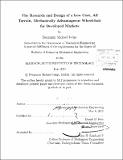The research and design of a low cost, all terrain, mechanically advantageous wheelchair for developed markets
Author(s)
Judge, Benjamin Michael
DownloadFull printable version (12.66Mb)
Other Contributors
Massachusetts Institute of Technology. Dept. of Mechanical Engineering.
Advisor
Daniel D. Frey.
Terms of use
Metadata
Show full item recordAbstract
This thesis presents a case for a paradigm shift in the way mobility technology is approached in the United States. Spawning from the research of developing world wheelchair technology, a conceptual design for a capable wheelchair is proposed based on the unique market elements of the United States. These factors include: user desire for devices that enable functional independence over a wider range of terrain, a user demographic that is among the most marginalized in the U.S. economy that cannot afford the typically high cost of assistive devices, and a cumbersome government reimbursement process that won't necessarily support more functional products, retarding industry development. A path for development is outlined through industrial design, solicitation of stakeholder input, and the exploration of both competitors and analogous technology. Notably, bicycling componentry, which is both appropriately engineered and ubiquitous, allows for drivetrain mechanism innovation within the wheelchair space. This leads to a robust, low cost, and mechanically advantageous wheelchair design for developed markets such as the United States.
Description
Thesis (S.B.)--Massachusetts Institute of Technology, Dept. of Mechanical Engineering, 2011. Cataloged from PDF version of thesis. Includes bibliographical references (p. 107-109).
Date issued
2011Department
Massachusetts Institute of Technology. Department of Mechanical EngineeringPublisher
Massachusetts Institute of Technology
Keywords
Mechanical Engineering.